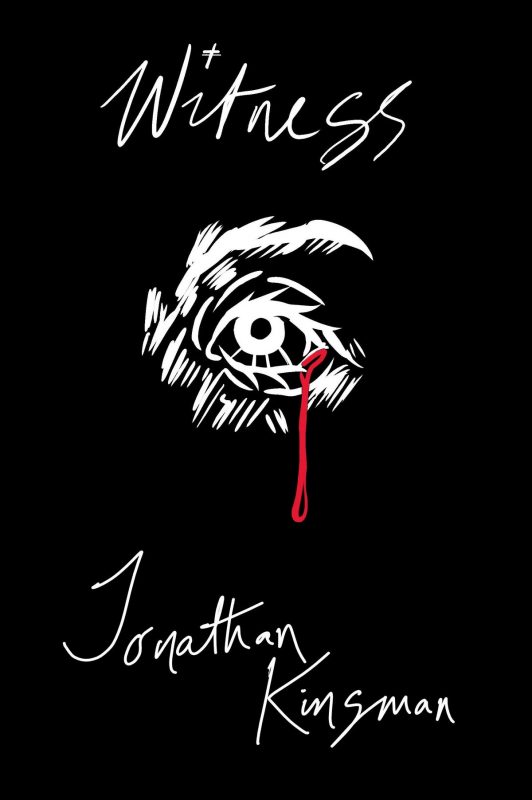REVIEW: JONATHAN KINSMAN’S ‘WITNESS’
WITNESS BY JONATHAN KINSMAN
BURNING EYE BOOKS
ISBN: 978-1911570820
£6.99/36 pages
Reviewed by Stella Backhouse
 Witness, Jonathan Kinsman’s stripped-down pamphlet of just fourteen poems, is a work profoundly indebted to the New Testament. But if you’re not an adherent of the Christian – or indeed of any – religion, don’t dismiss it as not your bag. There is nothing sanctimonious about Kinsman’s collection; no complacent spread of self-satisfaction, no embarrassing jingle of happy-clappy. Instead, Witness is a raw, confrontational examination of human potential, told through fourteen gritty snapshots of lives turned upside down.
Witness, Jonathan Kinsman’s stripped-down pamphlet of just fourteen poems, is a work profoundly indebted to the New Testament. But if you’re not an adherent of the Christian – or indeed of any – religion, don’t dismiss it as not your bag. There is nothing sanctimonious about Kinsman’s collection; no complacent spread of self-satisfaction, no embarrassing jingle of happy-clappy. Instead, Witness is a raw, confrontational examination of human potential, told through fourteen gritty snapshots of lives turned upside down.
Each of these taut, tense, slightly claustrophobic poems enters the mind of one of the twelve disciples (plus Mary Magdalene and Matthias, the injury-time substitution for Judas Iscariot), exploring the effects on them of their relationship with the living God. Additionally, the poems are arranged chronologically, following the time-line of Christ’s mission, with the spotlight falling on each character as they become important to the story. But this is not another weary retread of a tale that’s already two thousand years old. In Kinsman’s hands, the disciples are contemporary. You’ve met them. And that’s not all.
For all its plain, no-frills language, Witness is a careful and complex reinterpretation of biblical tradition. Andrew becomes a monosyllabic teenager from a left-behind town; Jude, a trans woman; Simon the Zealot, a wannabe recruit to the armed struggle; Matthew, an investment banker searching for a way out. By re-casting the disciples as contemporary cultural memes, most of them either reviled or simply overlooked by modern media, Kinsman is making an important point about the radical, refusnik origins of Christianity. After many centuries of the church’s enthusiastic endorsement of straight, white, wealthy male privilege, it’s a reminder that could hardly be more timely.
One of the most intriguing aspects of the collection is that all the poems are written in the second person. At first glance, this is a disorientating, mildly irritating viewpoint, uneasily positioned somewhere between slightly paternalistic intimacy and more distanced detachment. But with another reading, a second, more dizzying possibility rears up: the ‘you’ the poet is addressing is not the poem’s ostensible subject, but the reader themselves: YOU are a disciple; YOU have met God.
A related question is that of who exactly is the witness here – and what are they witnessing?
In Christian tradition, ‘to witness’ means to proclaim Christ and declare one’s belief. But from the collection’s title, it’s not clear whether the word is being used in this strictly religious sense, or more broadly; or even if it’s a command or a noun. In the case that it’s a noun, it’s also left unclear whether it refers to the disciples, who witnessed Christ at first-hand; to the narrator, who appears to have witnessed only the witnesses; or to the reader.
To unpack this, we need to turn to the subject with whom the narrator identifies most closely: the latecomer Matthias. The poem devoted to him is introduced by lines from the gospel of John: “You believe because you have seen. Blessed are those who have not seen, and yet believe” and begins with the words “and who are you, matthias? or, as right, who am i?” By the poem’s conclusion, all pretence has fallen away. Kinsman boldly states in language that could pass for biblical: “i believe in the world not as i’ve seen it/but as it could be. listen, you gathered here”. We who live in the twenty-first century arrived too late to meet Christ the man. But through belief you – yes, you – can still be his witness.
And what of those who are not believers? Can this collection speak to us too? To read a poem – or better still, a collection of poems – is to be accorded the rare, potentially revolutionary privilege of seeing the world through another person’s eyes, witnessing another person’s truth, and being changed by it. Everything we read becomes, in some way, a part of us. Perhaps it is only by witnessing each other that we become most fully ourselves.
Witness is available from Burning Eye Books, Waterstones, Hive Books and other online retailers.
